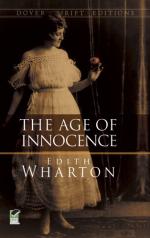Archer, after the first act, had detached himself from the party and made his way to the back of the club box. From there he watched, over various Chivers, Mingott and Rushworth shoulders, the same scene that he had looked at, two years previously, on the night of his first meeting with Ellen Olenska. He had half-expected her to appear again in old Mrs. Mingott’s box, but it remained empty; and he sat motionless, his eyes fastened on it, till suddenly Madame Nilsson’s pure soprano broke out into “M’ama, non m’ama . . . "
Archer turned to the stage, where, in the familiar setting of giant roses and pen-wiper pansies, the same large blonde victim was succumbing to the same small brown seducer.
From the stage his eyes wandered to the point of the horseshoe where May sat between two older ladies, just as, on that former evening, she had sat between Mrs. Lovell Mingott and her newly-arrived “foreign” cousin. As on that evening, she was all in white; and Archer, who had not noticed what she wore, recognised the blue-white satin and old lace of her wedding dress.
It was the custom, in old New York, for brides to appear in this costly garment during the first year or two of marriage: his mother, he knew, kept hers in tissue paper in the hope that Janey might some day wear it, though poor Janey was reaching the age when pearl grey poplin and no bridesmaids would be thought more “appropriate.”
It struck Archer that May, since their return from Europe, had seldom worn her bridal satin, and the surprise of seeing her in it made him compare her appearance with that of the young girl he had watched with such blissful anticipations two years earlier.
Though May’s outline was slightly heavier, as her goddesslike build had foretold, her athletic erectness of carriage, and the girlish transparency of her expression, remained unchanged: but for the slight languor that Archer had lately noticed in her she would have been the exact image of the girl playing with the bouquet of lilies-of-the-valley on her betrothal evening. The fact seemed an additional appeal to his pity: such innocence was as moving as the trustful clasp of a child. Then he remembered the passionate generosity latent under that incurious calm. He recalled her glance of understanding when he had urged that their engagement should be announced at the Beaufort ball; he heard the voice in which she had said, in the Mission garden: “I couldn’t have my happiness made out of a wrong—a wrong to some one else;” and an uncontrollable longing seized him to tell her the truth, to throw himself on her generosity, and ask for the freedom he had once refused.
Newland Archer was a quiet and self-controlled young man. Conformity to the discipline of a small society had become almost his second nature. It was deeply distasteful to him to do anything melodramatic and conspicuous, anything Mr. van der Luyden would have deprecated and the club box condemned as bad form. But he had become suddenly unconscious of the club box, of Mr. van der Luyden, of all that had so long enclosed him in the warm shelter of habit. He walked along the semi-circular passage at the back of the house, and opened the door of Mrs. van der Luyden’s box as if it had been a gate into the unknown.




